MPs block Conservative attempts to probe CBC coverage of Hamas attacks
TORIES HATE CBC
Bloc Québécois, NDP and most Liberal MPs on the House of Commons public accounts committee voted Tuesday to shut down debate on a Conservative motion that would have prompted a study of the CBC's coverage of the ongoing Israel-Hamas conflict.
Conservative MPs Melissa Lantsman and Rachael Thomas pushed their fellow parliamentarians to launch the study. They argued CBC's reporting on the conflict is biased because its language guide urges journalists to avoid using the words "terrorism" and "terrorist" when describing an attack and its perpetrators.
They wanted a CBC executive and its director of journalism standards to appear before MPs to answer questions about its policy on those words.
The Tory MPs suggested that CBC's policy warning against the use of "terrorist" terminology shields Hamas from criticism for perpetrating violence.
They also took issue with CBC guidance that says its journalists should be careful about describing the past Israeli presence in Gaza.
"Here's why this is so important — the CBC is a public broadcaster and gets $1.2 billion in taxpayer money," Thomas said during debate.
"The CBC is failing. They're failing the Jewish community. They're failing the innocent lives lost."
Thomas said the nature of Hamas's attack on Israeli civilians on Oct. 7 more than justifies the use of the word "terrorism."
"What other side would you take when you have 1,400 people massacred in an evening? When you have 40 babies who are beheaded? Whose side are you on?" she said. "As if there would be some other side you can take.
"This is a terrorist organization functioning in a sadistic manner. It is pure evil and to suggest otherwise is alarming."
Now that this motion to call CBC executives has failed at the public accounts committee, the Conservatives will present a similar one at the heritage committee later this week.
CBC's editorial leaders have defended the corporation's extensive coverage of the conflict and said there's no "ban" on the use of the words "terrorist" or "terrorism" — they can be used in a quote or a clip when said by somebody else.
Leon Mar, a spokesperson for CBC, said the corporation's journalists are on the ground in the region "risking their safety in order to tell Canadians what is happening there.
"They are the very best at what they do and the quality and accuracy of their journalism stands among the best in the world."
Mar said the corporation is aware that "some members of Parliament believe they have a role in determining how journalists do their work."
"It is worth remembering that the independence of CBC/Radio-Canada's journalism from the government and Parliament is protected in law, in the Broadcasting Act," Mar said.
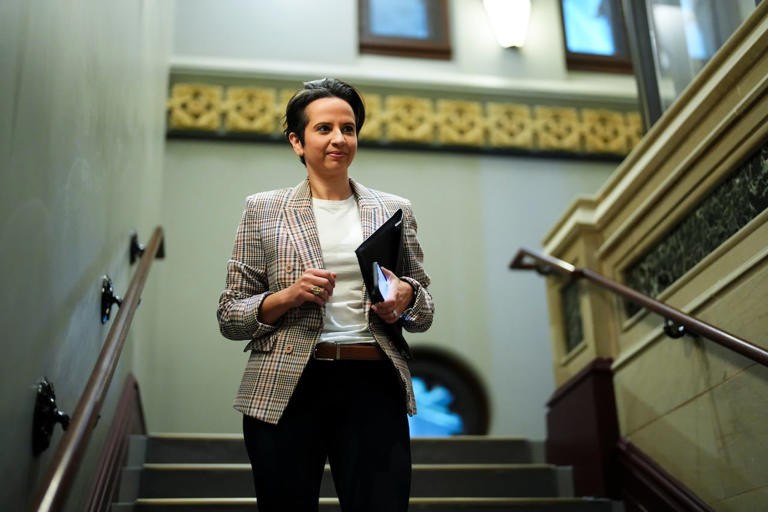
Conservative deputy leader Melissa Lantsman walks through West Block on Parliament Hill in Ottawa. (Sean Kilpatrick/Canadian Press)
Lantsman said the members of Hamas, a group created in the late 1980s with founding documents that called for the destruction of Israel, should be called terrorists because of the brutality they inflicted on innocent Israeli civilians during a sneak attack earlier this month.
The Hamas attack left hundreds of Israelis dead — including at least six Canadians. Others were kidnapped.
"The Liberal-NDP government must stop protecting the CBC's gross journalistic incompetence and allow Conservatives to demand answers from the CBC's senior leadership," Lantsman said.
Conservative Leader Pierre Poilievre has vowed to "defund the CBC" if elected.
Ontario Liberal MP Iqra Khalid, a member of the public accounts committee, said Parliament shouldn't be policing what's said by a free press.
"I think the media has a very, very critical role to play in today's day and age, not only ensuring that they are giving an objective and fair voice to what is happening in the Middle East but also making sure they're not politicizing or inflaming issues that create further harm and hurt to communities here in Canada," she said during debate on the motion.
"We as Parliament, whether we agree with it or don't agree with it, should not have a say on what they're reporting on. I think we need to lower the temperature on this very, very sensitive issue."
Khalid then tabled a motion to adjourn — shut down — debate.
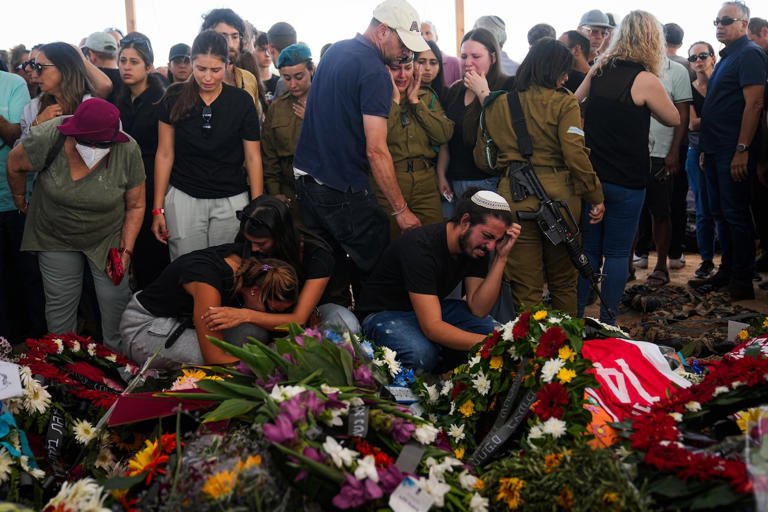
Mourners attend the funeral of the Kotz family in Gan Yavne, Israel, Tuesday, Oct. 17, 2023. The Israeli family of five was killed by Hamas militants on Oct. 7 at their house in Kibbutz Kfar Azza near the border with the Gaza Strip. More than 1,400 people were killed and some 200 captured in an unprecedented, multi-front attack by the militant group that rules Gaza. (Ohad Zwigenber/AP Photo)© Provided by cbc.ca
All Conservative MPs and Liberal MP Kody Blois voted against it.
Blois said he objected to closing off debate now because he had more to say on the issue.
Bloc Québécois MP Nathalie Sinclair-Desgagné said the CBC is a public broadcaster free from government control and Parliament should leave editorial decisions to the company's leadership.
"Whatever the colour of the government, whether it's red or blue, the public television is not state television. It has to remain neutral," she said.
During question period, Bloc MP Martin Champoux took a different approach — chiding CBC's management for "muzzling" its journalists by telling them how to describe Hamas violence.
Champoux, the vice-chair of the Commons heritage committee, said journalists should be trusted to pick their own words to describe "Hamas's heinous attacks."
"For management to issue a directive is something else entirely. It borders on censorship. The CBC management themselves are muzzling the press and taking a position that enters into the political debate, which is not their role," Champoux said.
He asked Heritage Minister Pascale St-Onge, the minister responsible for CBC/Radio-Canada, to "remind CBC management that newsrooms must remain free of political and ideological influence."
This controversy was ignited by a leaked internal memo from George Achi, the CBC's director of journalistic standards and public trust.
In his correspondence with CBC journalists in the early hours of the Hamas attack, Achi urged staff to read the language guide's policy on the Middle East and its section on Gaza and terrorism in particular.
"The notion of terrorism remains heavily politicized and is part of the story. Even when quoting/clipping a government or a source referring to fighters as 'terrorists,' we should add context to ensure the audience understands this is opinion, not fact. That includes statements from the Canadian government and Canadian politicians," Achi said.
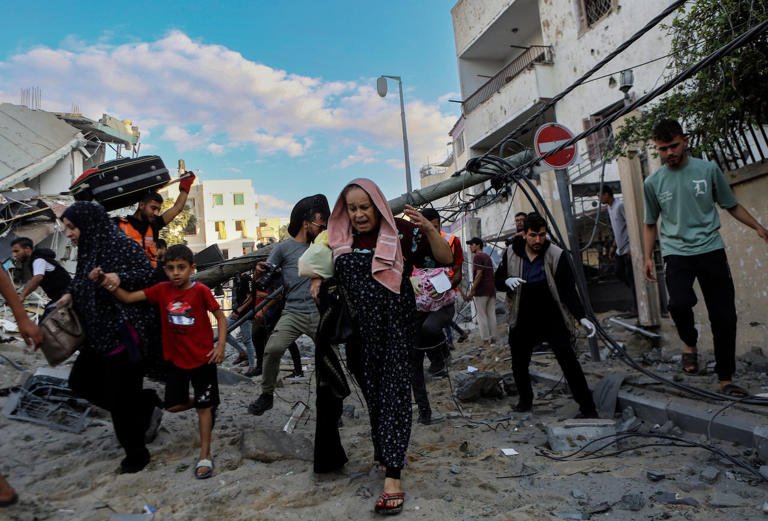
Palestinian families rush out of their homes after Israeli airstrikes target their neighbourhood in Gaza City, central Gaza Strip, Tuesday, Oct. 17, 2023.
Achi was not specific about what "context" should be added when quoting someone else branding Hamas as a terrorist organization.
Achi's note and his references to the language guide were subsequently leaked to an outside group and picked up by other news outlets, such as Fox News and the New York Post.
The CBC language guide itself urges "extreme caution" when labelling anybody a "terrorist."
"While the language is not seriously disputed in some cases, it's less clear if not highly contested at other times — which can lead to virtually endless questions about consistency and impartiality in our coverage of various attacks around the world," the guide reads.
"Terrorism generally implies attacks against unarmed civilians for political, religious or some other ideological reason. But it's a highly controversial term that can leave journalists taking sides in a conflict."
CBC explains why they avoid calling Hamas 'terrorists' in war against Israel
Story by National Post Staff •
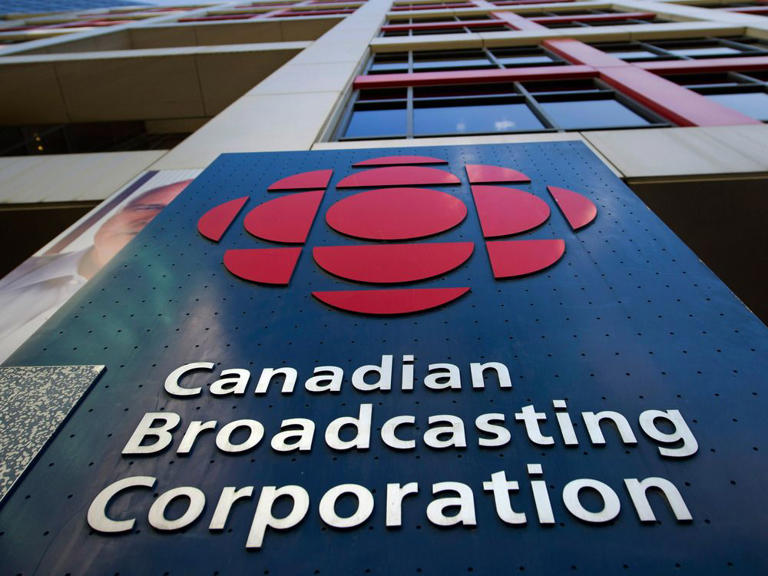
The Canadian Broadcasting Corporation Toronto headquarters. The CBC says it uses the word© Provided by National Post
In the wake of last week’s leaked CBC memo telling its journalists to avoid use of the word “terrorist” in reference to Hamas fighters in Israel and Gaza , the CBC’s editor in chief has crafted a more detailed missive for public release on the broadcaster’s website.
Brodie Fenlon, editor in chief and executive director of programs and standards for CBC News, posted the nearly 1,300-word reply on Monday.
“Hello and thank you for writing about our use of the word ‘terrorist,’” he begins. “During a period of tragic breaking news in Israel, a screenshot of an internal reminder about our longstanding editorial standards was published on social media — without the full context of those standards as they are practised in our newsrooms. This spiralled into a controversy that I believe is based on an incomplete understanding of our work.”
Brodie Fenlon: I run CBC News. Elon Musk’s Twitter changes had to be called out
Fenlon goes on to say that the CBC does not have a “ban” on the word terrorist. “As a matter of fact, you may have heard and read that word many times on all CBC News platforms over the past week. Our journalists cite it and quote it often, with attribution. That means they also tell the audience who has used it and in what context.”
He points to a recent story about airlifting of Canadians out of the region, noting that it uses the terms terrorist and terrorism six times, in each case in quotes from Justin Trudeau, Pierre Poilievre and Chrystia Freeland.
“Attribution of the word “terrorist” has been our policy for decades,” he adds, “mirrored by other news organizations such as the BBC, AP, AFP and Reuters, among many others.”
None of that convinced Conservative MP Rachael Thomas, who took to X (formerly Twitter) with her rebuttal. “This is a group of militant men who went in and killed 1,400 people in a night,” she said, referring to Hamas. “Who kidnapped, raped and murdered women … who went in and beheaded 40 innocent babies. This is no doubt a terrorist organization. Canada has had the officially listed as such for more than 20 years.”
NO BABIES WERE BEHEADED!
She adds that she wants to hold the CBC to account. “So my Conservative colleagues and I are bringing them to committee, or at least moving a motion to do so.”
The CBC’s job is to “bear witness,” Fenlon writes in his post. “But CBC News does not itself designate specific groups as terrorists, or specific acts as terrorism, regardless of the region or the events, because these words are so loaded with meaning, politics and emotion that they can end up being impediments to our journalism.”
He goes on to quote at length from the CBC’s language guide, which instructs journalists to refer to events such as the London bombings of July 2005, the Madrid train bombings of the previous year, and Sept. 11, 2001 as “attacks” and not “terrorist attacks.”
The guide also notes: “By restricting ourselves to neutral language, we aren’t faced with the problem of calling one incident a “terrorist act” (e.g., the destruction of the World Trade Center) while classifying another as, say, a mere “bombing” (e.g., the destruction of a crowded shopping mall in the Middle East).
“To be clear, this has nothing to do with Hamas or Israel, and nothing to do with the intensity of suffering and horror we saw last week,” Fenlon adds.
The post concludes: “I am not trying to convince you that this is the only way to approach editorial language … But I do hope that my explanation has reassured you of our good faith in this work, based on our mandate as an independent public service news organization — even if you disagree with the outcome here.”
Conservative MPs want to bring CBC executives before Commons committee over 'terrorism' language policy
Apair of Conservative MPs will try to compel a CBC executive and a journalism standards director to appear before a House of Commons committee to defend the company's language guide — which discourages the use of the words "terrorism" and "terrorists" when describing attacks and their perpetrators.
Alberta Conservative MP Rachael Thomas, the party's Canadian heritage critic, said in a statement posted to social media that the idea is to hold the Crown corporation accountable for what she calls "its biased coverage of Hamas' attack on Israel."
She said an internal email about language guide policies that urges caution about using the word "terrorist" — which was subsequently leaked and picked up by other outlets, including Fox News — suggests the CBC is downplaying violence perpetrated by Hamas against innocent Israeli civilians.
She said the news organization should clearly refer to the attackers behind the "horrific, sadistic violence" as terrorists.
She also took issue with CBC guidance that says its journalists should be careful about describing the past Israeli presence in Gaza.
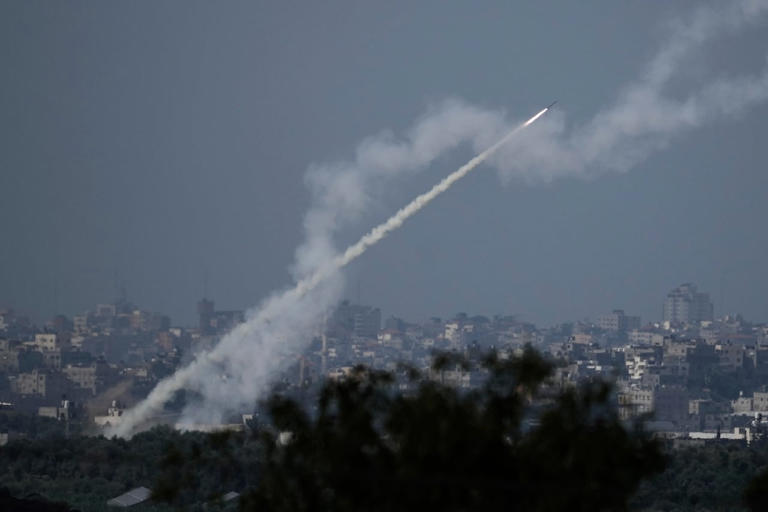
Rockets are fired toward Israel from the Gaza Strip, as seen from southern Israel,
on Monday, Oct. 16, 2023. (Leo Correa/AP Photo)
Leon Mar, a spokesperson for CBC News, said the corporation's journalists are on the ground in the region "risking their safety in order to tell Canadians what is happening there.
"They are the very best at what they do and the quality and accuracy of their journalism stands among the best in the world."
Mar said the corporation is aware that "some members of Parliament believe they have a role in determining how journalists do their work."
"It is worth remembering that the independence of CBC/Radio-Canada's journalism from the government and Parliament is protected in law, in the Broadcasting Act," Mar said.
Thomas is backed by the party's deputy leader, Ontario MP Melissa Lantsman, who said she'd force the issue before the public accounts committee, which is due to meet Tuesday.
The Conservative MPs would need the support of at least one other party to compel the committee to launch a study of the issue.
Lantsman said she will pressure the NDP to back the study.
"Will they allow a recipient of $1.4 billion in tax dollars to give a pass to terrorists?" she said, referring to the corporation's parliamentary appropriation. CBC/Radio-Canada received roughly $1.2 billion in government funding in 2022, according to the most recent annual report.
Conservative Leader Pierre Poilievre has vowed to "defund the CBC" if elected.
In a video posted to social media, Lantsman said the CBC doesn't have "journalistic integrity" because "if you can't call people who murder the elderly, kidnap children, rape women and kill entire families terrorists, then I don't think it's worth funding."
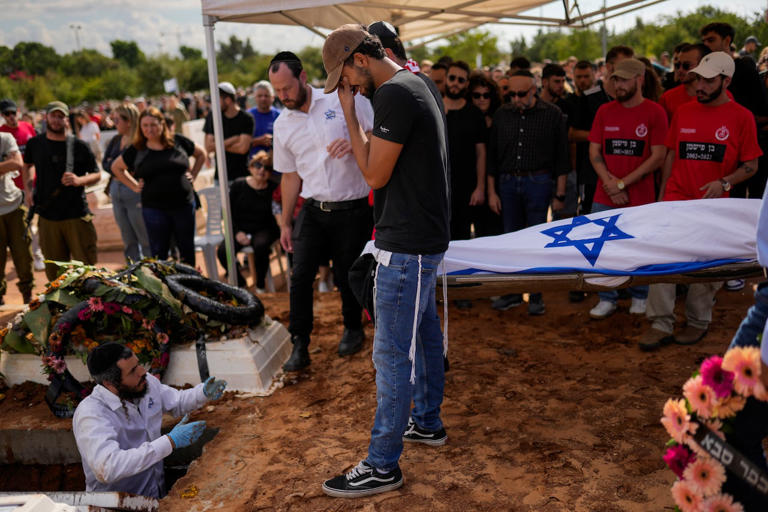
Covered with the Israeli flag, the body of Ben Fishman is buried at Pardes Haim cemetery in Kfar Saba, near Tel Aviv, Israel, Sunday, Oct. 15, 2023. Fishman was killed when Hamas unleashed its attack on thousands of Jews attending a music festival in southern Israel earlier this month. (Francisco Seco/AP Photo)© Provided by cbc.ca
Brodie Fenlon, CBC News' editor-in-chief, defended the corporation's reporting on the conflict in an editors' blog posted Monday.
The post came more than a week after the language guide policy was disseminated to CBC journalists and leaked to an outside group.
"Within hours of these shocking Hamas attacks, we had several teams on the ground in Israel, more than any other Canadian news organization, and we documented in gruesome, explicit detail what transpired over that weekend," Fenlon wrote.
"I believe that we, as a news organization, have accurately depicted the horror of what happened in those attacks — and there is no doubt in the minds of our audience about what Hamas did."
Fenlon also pointed to news items that have included the words "terrorist" or "terrorism" when they have been attributed to others. There isn't a "ban" on use of the word, he said.
"You will hear the acts described as terror. You will hear that governments, including Canada's, have designated Hamas a terrorist organization. And you will always hear those terms attributed to governments, officials, authorities, experts and politicians," Fenlon said.
Hamas was created in the late 1980s with founding documents that called for the destruction of Israel. It has said its goal is to drive all Israeli forces from Palestinian territories and set up an Islamic state. It has been designated a terrorist entity under Canadian law.
In the early hours of Hamas' brutal surprise attack on Israelis, which left hundreds dead and others captured, George Achi, the corporation's director of journalistic standards and public trust, asked journalists to read the language guide entry on the Middle East.
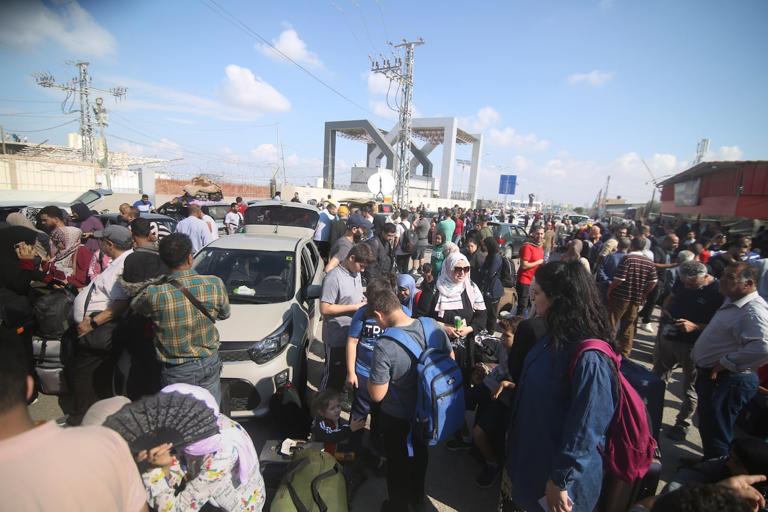
Palestinians wait to cross to the Egyptian side at Rafah border, Gaza Strip, Monday, Oct. 16, 2023. (Hatem Ali/AP Photo)© Provided by cbc.ca
He highlighted that it's acceptable to use the short-form "Gaza" when referring to the Gaza strip.
But he said the 2005 Israeli disengagement from the Palestinian territory should not be described as "the end of the occupation" because Israel maintains control over the area's airspace, seafront "and virtually all movement into or out of the area."
In 2005, under former prime minister Ariel Sharon, Israel dismantled longstanding Israeli settlements and forcibly expelled some Jewish settlers from Gaza amid fierce opposition from some Israeli politicians and citizens.
Hamas won 2006 parliamentary elections and in 2007 violently seized control of Gaza from the internationally recognized Palestinian Authority.
Israel then responded to the Hamas takeover with a blockade on Gaza, restricting movement of people and goods in and out of the territory — a step it said is needed to keep the group from developing weapons.
"Our description should be fact-based, referring to the end of permanent Israeli military presence on the ground," Achi said.
He also said CBC journalists "do not refer to militants, soldiers or anyone else as 'terrorists.'"
"The notion of terrorism remains heavily politicized and is part of the story. Even when quoting/clipping a government or a source referring to fighters as 'terrorists,' we should add context to ensure the audience understands this is opinion, not fact. That includes statements from the Canadian government and Canadian politicians," Achi said.
Achi was not specific about what "context" should be added when quoting someone else branding Hamas as a terrorist organization.
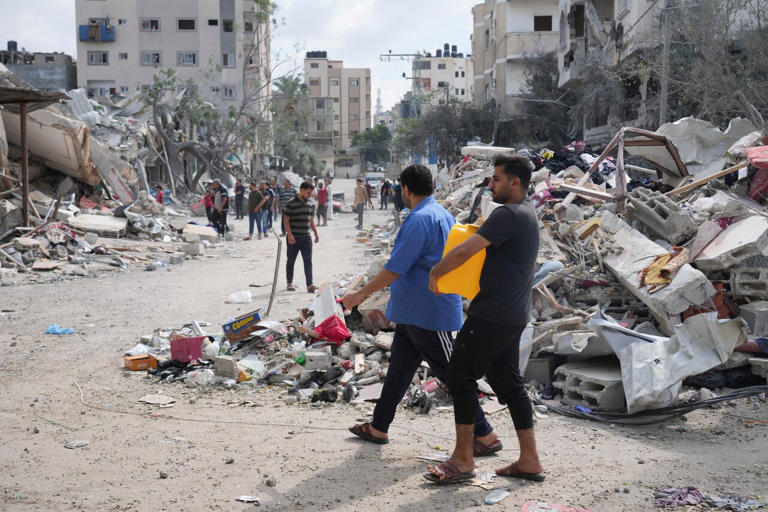
A Palestinian carries a water canister by buildings destroyed in an Israeli airstrike in Nuseirat camp in the central Gaza Strip, Monday, Oct. 16, 2023. (Hatem Moussa/AP Photo)© Provided by cbc.ca
Thomas and Lanstman said Achi should be called to appear before the Commons' heritage committee.
The two MPs also said Catherine Tait, the president and CEO of CBC/Radio-Canada, should "appear for two hours by herself within seven days of the motion being adopted."
Mar, the CBC spokesperson, did not address a question about whether Achi or Tait would agree to testify if called to appear by the committee.
The language guide, which is not intended for public consumption and is password-protected to restrict its use to employees, goes into greater detail about using the words terrorist and terrorism in CBC news coverage.
The overarching goal, the guide states, is to avoid "virtually endless questions about consistency and impartiality in our coverage of various attacks around the world."
"Terrorism generally implies attacks against unarmed civilians for political, religious or some other ideological reason. But it's a highly controversial term that can leave journalists taking sides in a conflict," the guide reads.
"By restricting ourselves to neutral language, we aren't faced with the problem of calling one incident a "terrorist act" (e.g., the destruction of the World Trade Center) while classifying another as, say, a mere "bombing" (e.g., the destruction of a crowded shopping mall in the Middle East)," the guide reads.
BBC, the British public broadcaster, also avoids using the words terrorist or terrorism unattributed.
John Simpson, the BBC's world affairs editor, said in a story last week that terrorism is "a loaded word" that "people use about an outfit they disapprove of morally."
"It's simply not the BBC's job to tell people who to support and who to condemn — who are the good guys and who are the bad guys," Simpson said.
No comments:
Post a Comment